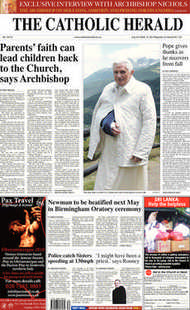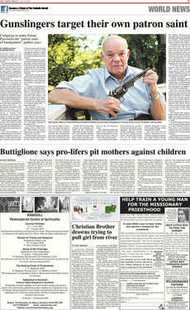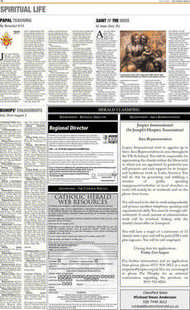Page 3, 24th July 2009
Page 3

Report an error
Noticed an error on this page?If you've noticed an error in this article please click here to report it.
Tags
Share
Related articles
Church Opposes Compulsory Sex Education For Four-year-olds
Quango Calls For Sex Education For Primary Pupils
Parents Told Not To ‘preach Sexual Morality’ To Teens
Coming Next: Sex-ed For Five Year Olds
Sex And An Eight-year-old Voyeur
Nhs Leaflet Tells Children They Have ‘right’ To Sex
Parents ‘will lose rights’ under sex education proposals
BY ED WEST
PARENTS WILL be given little say in the content of sex education classes under Government plans to make the subject compulsory for children as young as five, it was claimed this week.
At present schools are free to draw up their own policies on sex education and must consult parents. But according to a new report by the Family Education Trust, proposals by Schools Secretary Ed Balls to make the subject mandatory in all schools this autumn will inevitably limit parents’ influence.
The FET says parents will have less power to keep explicit materials away from their children or resist government-sponsored sex education and contraceptive advice, which the report calls “misplaced” and “counterproductive”.
Norman Wells, the trust’s director, said: “Making personal, social and health education (PSHE) statutory would reduce the influence of parents over what is taught. Making it part of the curriculum would inevitably make schools less accountable to parents in what is a particularly sensitive and controversial subject area. There is a definite agenda at work to undermine the role of parents and to tear down traditional moral standards. The need for parents to be alert and vigilant has never been greater.” Under the plans primary schools will teach “sex and relationships education” for the first time.
The plans suggest that five-yearolds will learn to name parts of the body while seven-year-olds will learn about physical changes linked to puberty. In secondary schools sex education would become a statutory part of the national curriculum for the first time.
Mr Wells said: “One of the government’s stated aims in proposing to make PSHE statutory is to ensure consistency. This raises the very real possibility that some schools would be forced to compromise their beliefs on controversial areas such as contraception, abortion and homosexuality in the name of consistency. Allowing schools flexibility to teach sex education in line with their ethical and moral values is incompatible with the goal of consistency. It is unconvincing... to suggest that young people are placed at risk of teenage pregnancy and sexuallytransmitted infections for want of knowing the proper names for two or three parts of their anatomy from the age of five.
“It is equally spurious to defend compulsory sex education on the basis that young children need to learn that their relationship with their parents is different from their relationship with their grandparents, which in turn is different from their relationship to their siblings, their friends, their neighbours and their teachers. Children already learn about different types of relationships in the context of everyday life. There is no need to formalise and professionalise such things by adding them to an already overloaded curriculum.” Although parents would still have the right to withdraw their children from lessons, this is extremely rare, due to the effects of peer pressure. A spokesman for the Department for Children, Schools and Families said: “Schools have an important role to play in providing effective sex and relationship education, which is essential if young people are to make responsible and well informed decisions.” Oona Stannard of the Catholic Education Service said: “I do back PSHE in the curriculum. Mindful that it is a broad spectrum, and includes healthy eating and is not just about sex, there is a lot to commend that they learn in schools where they learn about sex in a safe environment. I accept that it is very important that parents are involved with PSHE at home and children learn their parents’ expectation, but it helps also to learn it at school.
“Good PSHE is about avoiding the sexualisation of children. I have been like a cracked record in insisting that parents have the right to withdraw them from class.” But Dr Josephine Treloar, of the parents’ pressure group Faith and Family, claimed that Church authorities had not done enough to help Catholic parents. She said few parents had “the formation and confidence” to take children out of class.
blog comments powered by Disqus





















